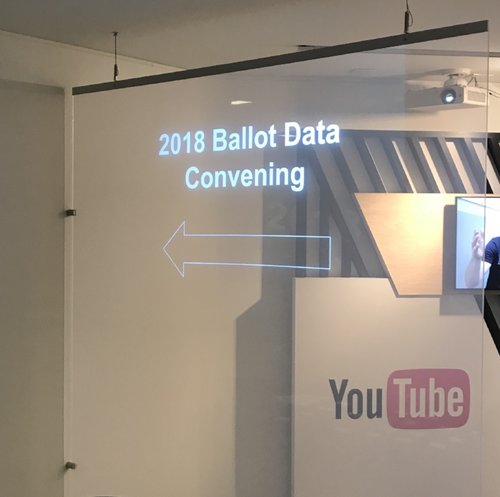CTCL Hosts Third Annual Ballot Data Convening

In late January, CTCL’s civic data team hosted the third annual Ballot Data Convening, at Google’s Washington, DC offices. As with previous years, the Democracy Fund sponsored convening brought together a wide range of organizations that use ballot data to drive civic participation. This year, attendees ran the spectrum from small civic engagement organizations to large tech companies, and included representatives from the worlds of funders, academia, and government.
All told 38 individuals from 25 organizations were in attendance for a full day of discussions, kicked off with a happy hour the night before sponsored by Microsoft. Topics covered during the convening included opportunities and challenges for collaboration in 2018, how we as a community can get better at measuring who our work impacts and how, and an update on the ballot data working groups from 2017.
In small groups, then in plenary, the morning was focused on discussing the work ahead of us in 2018. Participants highlighted the heightened energy and public interest in elections going into 2018 as an opportunity for driving increased participation. On the other hand, this increased attention also brings additional scrutiny, and more candidates running for office means more work to do prior to the election. The group also discussed the implications of new federal and state initiatives on our work, particularly around cybersecurity. All told, those in attendance were pleased with the progress we’ve made and institutional knowledge we’ve built as a community over the past years, but emphasized that challenges like a lack of funding and tight timelines as continued issues. A full set of notes of this discussion as taken on the day of the meeting can be found here.
We also spent time as a group discussing how we think about the impact of our work. This included discussing answers to pre-convening survey questions around who organizations viewed as their target audience and what behaviors they hoped to produce. These questions drew a wide range of responses. Some groups use surveys and randomized experiments to explore the answers to these questions, while others had little to no resources available explicitly for measurement. This disparity in measurement resources, as well as inherent limitations in some groups’ ability to access data from partners, will be a key ongoing discussion topic in working groups throughout 2018.
Afternoon sessions were focused on updates on working groups’ progress and breakouts on their subject areas. Representatives from Democracy Works and the National States Geographic Information Council gave updates on their work on identifiers and political geography, respectively, and CTCL gave updates on the audience & impact working group as well as the data & sources group.
A summary of resources shared at the convening, including notes, attendees, and slides, can be found here. Stay tuned in this space or join our civic data mailing list for updates as more formalized findings and resources are rolled out!